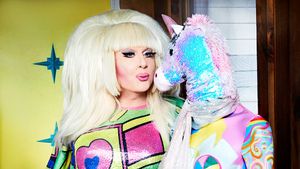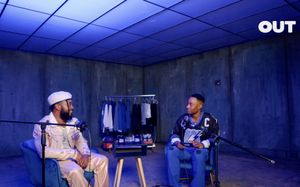Two things you probably need to know about me: I am a trans woman and I work at a tech startup as a QA engineer. This means having to deal with a lot of ignorance around social justice issues, especially when it comes to being trans.
One recent example: Our office is right on Market Street in San Francisco, and when we open the windows on warm summer days, we get treated to the sights (and smells) of a city in heat. On one particular afternoon, we got a perfect view of the kid who sings Bruno Mars's "Just the Way You Are" repeatedly. His singing is so bad that my coworkers all took a break to complain about it. I wasn't trying to eavesdrop, but they don't keep their opinions to a whisper either.
"He should try working a different corner, seriously."
"Ha, yeah, working a different corner, maybe he should consider becoming a tranny."
All at once, I could feel the blood rushing to my face. I pulled my hood up, putting a thin fleece barrier between me and the word that has since changed how I view working here.
Put simply, "tranny" is a slur. A lot of trans people, including myself, hear this yelled from cars as we walk on the street. It's what gets whispered in hatred when someone takes issue with you expressing who you are. And in too many cases, it's what gets yelled as someone is beaten up for trying to be who they truly are inside.
This one little word has a strange power to make me feel powerless, because for a few excruciating moments after I hear it, I'm not at work anymore. I'm 6 years old again, playing Pretty Pretty Princess with my cousins, and my dad is yelling at me for acting like a girl. Then I'm 12 and still struggling with my gender identity. My uncle is telling my mother about my Internet search history, which is full of questions like, "Why do I feel like a girl?" and "What is a transsexual?"
I remember not sleeping that night because I couldn't stop crying.
Then I'm 25, and I'm coming out to the friends I'd eventually have to call strangers, because they don't get it -- and I begin to understand the full effect of that word as they taunt me with it while leaving me behind. Finally, I'm back to being 27, and I'm once again sitting at my desk at work trying to figure out how to leave the office gracefully.
I didn't want to stand up. I didn't want to make it obvious that I was leaving because of what was said. I didn't want to become a lightning rod for criticism because I was turning this word into "a thing." So I did what so many other people, trans or not, have chosen to do in my situation: I kept quiet.
I have regretted it ever since.
I wish I'd stood up for myself and my community against these micro-aggressions, which are so pervasive in tech. They exist everywhere, like getting thrown on a mailing list where the engineering lead opens every email with "gents" even though he knows I identify as a woman or being greeted with downturned eyes and quickly hushed conversations when I pass. Or overhearing people casually use the word "tranny" and then observing their resistance when someone else explains to them why that's inappropriate. There was also the time an engineer was telling some not-so-female-friendly jokes and he followed up his remarks with a "What? There's no women here ... Oh, sorry, Jessica."
These problems aren't isolated to just one company either. Take, for example, Kortney Ziegler, who wrote an article for Model View Culture describing his experiences as a trans man in tech. He describes an instance in which a Twitter pal "remarked that I 'looked more like a real man in person than in my avi.'" He goes on to say, "She then followed her 'compliment' by introducing me to her friends using the incorrect gender pronoun while gloating about my work, at which the friends seemed visibly confused."
A friend of mine who identifies as genderqueer told me about how they had to explain to their own HR department that outing someone without their permission is wrong. If you can't rely on your HR department, where they're supposed to know this stuff, then who can you rely on?
This lack of knowledge about how to properly handle trans issues exists industrywide. On top of it all, there is an immense pressure to believe that these problems don't matter, shouldn't be discussed, or don't exist at all. If we don't fit into "the culture" in tech, we get iced out silently and forcefully. I am sorry to say that each time I was faced with this pressure, I kept quiet. I wish I had said something.
But I'm saying something now. You -- yes, you -- the person working in tech who thinks they can skate by without acknowledging that these are issues, you are making it hard for other people who aren't like you to work in this industry.
For all its claims of diversity and understanding, the tech industry has done so little to put its knowledge of these issues into actual practice. Women still complain of harassment and exclusion. Representation for people of color is still depressingly low. And trans issues are as foreign as good hygiene.
I go home at night and try to justify the day's difficulties to myself. The problem is, it shouldn't be up to me to justify these things away. Nobody should have to constantly make excuses for how they feel when their identities are infringed upon.
But, you see, people are ready to explain away the complaints. Claims of sexism and trans-misogyny are quickly dismissed because the actions perpetuating them are so insidious. Ariel Schrag describes this problem in the comic "The Ping-Pong Theory of Tech Sexism," where she shares a story about a butch lesbian who complains that male coworkers just don't get that they're acting in a sexist manner.
My friends and coworkers also regularly offer glib answers to my explanations of being offended.
"You're overreacting!"
"It's really nothing, that's just how they are."
"It can't be that bad, you must've misunderstood."
All of these excuses make me feel crazy. They make me feel like the problem is with me and how I don't "fit in" with the culture. Frankly, I am sick of people gaslighting me because they don't want to acknowledge that there is an actual problem with how people are treated.
I exist in this weird space where I feel like I have to compromise my identity in order to be in this boys' club of an industry. I feel pressured to act and be a certain way just to get through the workday. I have to keep quiet about who I really am, because to bring any attention to myself and my issues beyond a few trusted colleagues wouldn't bode well for my future at this job.
I thought I was done lying to myself and hiding who I was when I transitioned. I never in a million years thought I'd be forced back into a closet by people who were supposed to understand, people who work in an industry that is ostensibly progressive and forward-thinking.
The Internet, with all its problems and all its flaws, has reminded me that I do have a voice. It's been a platform for spreading sorely needed awareness around issues like these. Without it, I know I'd continue suffering in silence. More than that, it's brought me the single most invaluable resource for dealing with these problems: my friends. Because of them, I don't have to deal with these things alone.
I believe that despite everything, this city is still one of the few places where people like me can find the support we need to continue existing. San Francisco still attracts some of the most open-minded individuals, and it has given me some of the best friends I could ever have hoped for. One of the most crucial resources any transitioning individual needs is a strong support network, and I count myself lucky to have found mine here in San Francisco.
Now I am finally taking my chance to stand up and tell my story. This is for every time I refused to speak up for myself. This is for every time I decided to compromise on my identity for a little bit of comfort. This is for every time I conveniently forgot I had a voice.
This time, I've found it. And I'm not letting go.
JESSICA LACHENAL is a writer who works by day as a QA engineer, breaking cell phones. Her LGBT-focused writing has been featured on Autostraddle and Model View Culture as well as in Frontiers LA magazine and The Bold Italic. She is also a show reviewer and photographer for Spinning Platters, a Bay Area music blog. She can be reached at HipsterChick.net.
This piece originally appeared in The Bold Italic.














































































